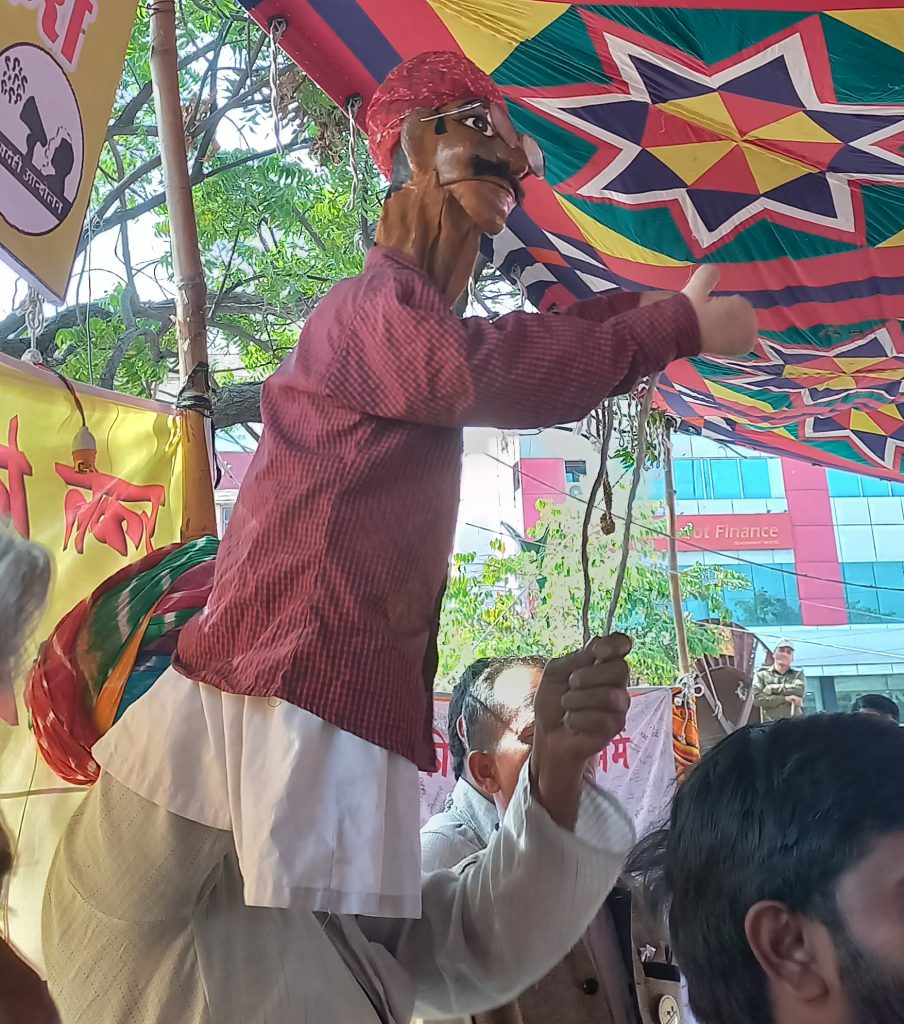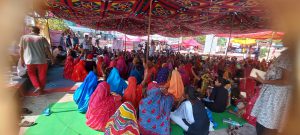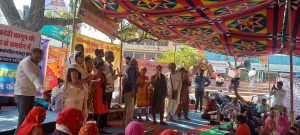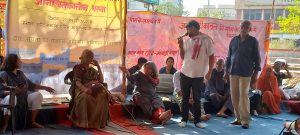

In March 2021, around 100 organizations came together under the banner of Soochna Evum Rozgar Abhiyan in Jaipur – the capital city of India’s largest state Rajasthan — to demand that the State passes a law on social accountability and transparency. In December 2021, the organizations started a march covering 18 of the State’s 33 districts mobilizing people. In each district, the activists addressed a range of issues such as the need to protect whistleblowers, the right to education and healthcare, delivery of rations, payment of pensions, the effective implementation of the Forest Rights Act which recognizes the rights of tribal and other forest dwelling communities and the need to hold officials accountable when the delivery of schemes for citizens suffers.
The beginning of the agitation goes back to 2015 when grassroots activists realized the dire need for a law which would empower citizens to question the Government on its lack of administrative accountability. Despite the initial assurance of the Indian National Congress to bring in the law once it would come to power, the promise is still pending since it was elected in 2018.
In this interview with Ritwika Mitra, Nikhil Dey – the founder of workers-led organization Mazdoor Kisan Shakti Sangathan that is at the helm of the protests in the State – speaks of the need of a sustainable movement to bring about change.
[The interview has been edited for clarity and readability.]
Rajasthan is not new to social justice movements. The movement for the passing of the Right to Information Act (RTI), an important legislation that empowers citizens to seek information, started in Rajasthan and was passed after a struggle for over ten years. Can you talk about how sustained advocacy has worked in the State?
In Rajasthan, we all work together. The workers-led organization Mazdoor Kisan Shakti Sangathan (MKSS) plays an important role in bringing everyone together. The Soocha Evum Rozgar Abhiyan is a wide platform that includes many organizations spread out across the State. The trajectory of these movements has been built over many years and it comes out of a very strong sense of cooperation and understanding that some processes are political, meaning democratic. We do not avoid [dialogue with] political parties because they are important and we understand our [political] role even though we are not standing for elections. People in the Government know that for many social issues our understanding is as good as theirs, if not better. There is a coming together around a lot of issues. We are building a very wide solidarity network of disadvantaged people. Now, those disadvantaged people cannot fight on their own, but when you bring them together under this rainbow coalition, then they become the majority. We bring together women, Dalits, nomadic communities, the elderly, the differently abled and when they listen to each other’s issues with compassion, then it strengthens their cases. We have been building things slowly, it has taken us ten years – some things require much time – but now the movement is getting popular and understood.
Can you talk about the guiding principles of the proposed social accountability law?
We want to turn accountability upwards. It is not like there was no accountability. Like in the case of RTI, it is not that there were no records. It is just that the records were not made available except to people up in the hierarchy. In one stroke, RTI said that these records should be made available to citizens. Similarly, this law says that it is not just senior officers, but also ordinary people can ask if the designated people in the system of governance are doing their jobs, and if not, why they are not doing it. People should be able to file a grievance in their areas and should not have to approach higher functionaries for redressal of their complaints. For a citizen-centric accountability mechanism, there are six guiding principles embedded in the law: the need for information, hearing on a given date, time-bound action, people’s participation, protection and collective public platforms where citizens and state representatives are present.

What has been the biggest success of the movement for the social accountability law in the Rajasthan?
In 2016, we organized the first march through Rajasthan’s districts mobilizing people on the need to bring more accountability and transparency in the State. At that time, there was an initial commitment made by the Congress party and many other parties in support of the law. The Bharatiya Janta Party (BJP) had also made noise about the need for a good governance law. There was a very real feeling during the first march that the law will come into effect because of these initial commitments. The Congress government made a commitment in its election manifesto in 2018 and then in its first budget speech after coming into power. Subsequently, it set up the Ram Lubya committee. Now, it is time for the government to enact the law. In December 2021, we started another march to demand that the law be passed.
There is a feeling among the people that the achievement of the march is far and wide. During our campaign in 13 districts over 18 days, people connected with the basic tenets of what the law promises. This is much like how the Right to Information movement was spread in its early days.
We have also been recording people’s grievances on the portal Rajasthan Sampark. We have recorded over 3,500 complaints since December 2021. We are reviewing how the administration is responding to grievances – how much of it is serious consideration of redressal and how much of it is symbolic. The grievances make the discourse on accountability much richer. Each grievance is part of the movement – they do not only strengthen specific issues, but the movement as a whole. We are making progress as we go along.
What is the significance of the accountability law in the national landscape?
The first step to demand a legal framework for accountability came from a national effort. It began when the Right of Citizens for Time-bound Delivery of Goods and Services and Redressal of their Grievances Bill, 2011, was drafted, went to a standing committee and then to the Parliament. But it was never passed as a law. Then we brought it to the State because there was no progress at the central level. We will absolutely go back to the central government. We believe Rajasthan passing the law would put pressure on the Center.
You mention that 3,500 complaints have been filed since December 2021. Which are the areas on which you have received the maximum number of complaints?
There are 42 areas that we have received grievances on, but the big ones are pensions, Mahatma Gandhi National Rural Employment Guarantee Act (MGNREGA), Forest Rights Act, Scheduled Caste and Scheduled Tribe Prevention of Atrocities Act, farmer loan waivers, the lack of proper toilets, atrocities on Dalits, women and other minorities.

Can you talk about the next phase of the movement?
Currently, the Government is consulting us on the contours of the draft law on social accountability. We have always maintained that we are happy to sit with the Government for consultations. Though there is huge resistance in the bureaucracy [about the law], I think we have got past it to some extent. But it still requires a final push. We have done a lot of work with the Government and gone through each clause. The process of legal vetting is still on. This is what the government has told us, but in politics you never know so we are trying to evaluate where the Government stands. If there is a law, a march has the means of publicizing it everywhere. And if there is no law, then we have to fight for it in whatever way it is possible. First there will be a march, then we will do a sit-in agitation Through the months of April and May 2022, we held small-scale consultations across villages and raised awareness around the need for accountability law. We also recorded people’s grievances on governance issues wherever we visited because recording grievances is a practical way of consulting citizens.
What is the importance and mechanism of a sustained advocacy?
There are different aspects to it. In Jaipur, we meet ministers and other politicians. There is state and national media coverage. When it comes to the decentralized movement in the districts, we plan to build accountability kiosks and take them across villages. When we look at issues locally, the focus is based on the area. We may be focusing on problems from a mining area, a drought-affected area, or where people are desperate for work under the Mahatma Gandhi National Rural Employment Guarantee Act [India’s rural livelihood scheme which promises 100 days of work to rural households. Rajasthan has recently raised the number of days to 125]. Even though the law has not been enacted yet, people have become more aware of how the law will benefit them through the process of building the movement. India has many laws that continue to remain under-utilized. The reason why RTI and MGNREGA are popular is because of the movements’ efforts before these schemes were enacted.

How do you plan to take the movement to the rest of India?
Some of us will go to other states. This would not be to run the movement but to inform people how it came about and the process behind it. Once there is a law in Rajasthan, and I am hopeful this will be the case soon, then there will be a lot of pressure on other states and the central Government.
Do you think the agitation can be scaled up nationally?
This has to be married with other social movements, the right to food campaign, or the RTI in some states. We have many messages coming from states like Haryana, Jharkhand, Karnataka, Gujarat, Maharashtra. We know activists who will support this movement.
Have you looked at what happened in other countries in relation to accountability laws?
From the time of the RTI movement, India has shown a different perspective and led the way on social audit and people’s accountability. With the accountability law, everyone in the Government is accountable to the people and all laws would be brought under a single framework. Other countries in the West and the Global South are looking at our accountability law. There are RTI laws and freedom of information laws in many parts of the world – one of the important things about the Indian law was India’s penalty provision in the right to information law. This law takes the same provision if the grievance officer does not report on time making them personally liable. This punitive part is absolutely critical.

Can you elaborate on how the accountability law would be an overarching one?
This law will apply to all other laws that do not have accountability mechanisms built into them. For example, the Acts of the Right to Health and the Right to Education are very poor in terms of accountability. With this accountability law, there will be nothing to prevent citizens from demanding accountability.
How do you design the architecture of the protest?
There are a lot of people who contribute to it. The main thing is to see that every person has a role: someone is cooking, someone is talking to the media. It is a coordinated effort where everyone is valuable. There is a cohort involved in the decision-making. We want the protesters to be energized that’s why we decided early on that that we would not go for hunger strike because the pressure is on the protesters. When we are desperate for a solution, the protest should build on itself rather than wearing us down.
Though this movement precedes the farmers’ protests, how have you drawn inspiration from them?
It is impossible not to draw inspiration by the phenomenal scale and unprecedented strength of the farmers’ protest. I think this it is not something easy to replicate, but it can inspire as they went against the greatest of odds. The difference between the farmers’ protest and the accountability march is that their fight was against something negative while this is a fight for a certain kind of reform and change.
Do you think there was a shift in how state administrations view movements since the farmers’ protest? Was it easier for the organizations in Rajasthan to get permission for sit-in agitation in the aftermath of the farmers’ protest?
They [the farmers] managed to do what they did just based on pure conviction and numbers. We are tiny compared to the farmers’ movement. Each movement finds its own niche and a different kind of pathway. Even here, on the first day, the administration had not allowed people to sit in for the protests. We fought for 15 days so that we would get permission, and we finally got it. All of us had to fight for the basic tenets of democracy.





